利用STM32CubeMX生成HID双向通讯工程
使用开发板为正点原子ministm32
现在我们先使用HID descriptor Tool来生成我们需要的hid的

保存使用选择.H
// D:\usb资料\HID\MSDEV\Projects\test\Desc_HID.h
char ReportDescriptor[] = {
0x06, 0x00, 0xff, // USAGE_PAGE (Vendor Defined Page 1)
0x09, 0x01, // USAGE (Vendor Usage 1)
0xa1, 0x01, // COLLECTION (Application)
0x09, 0x01, // USAGE (Vendor Usage 1)
0x15, 0x00, // LOGICAL_MINIMUM (0)
0x26, 0xff, 0x00, // LOGICAL_MAXIMUM (255)
0x95, 0x40, // REPORT_COUNT (64)
0x75, 0x08, // REPORT_SIZE (8)
0x81, 0x02, // INPUT (Data,Var,Abs)
0x09, 0x01, // USAGE (Vendor Usage 1)
0x15, 0x00, // LOGICAL_MINIMUM (0)
0x26, 0xff, 0x00, // LOGICAL_MAXIMUM (255)
0x95, 0x40, // REPORT_COUNT (64)
0x75, 0x08, // REPORT_SIZE (8)
0x91, 0x02, // OUTPUT (Data,Var,Abs)
0xc0 // END_COLLECTION
};
现在使用使用STM32CubeMX来生成我们的工程




将char ReportDescriptor[34] 修改工程中CUSTOM_HID_ReportDesc_FS[USBD_CUSTOM_HID_REPORT_DESC_SIZE]
/** @defgroup USBD_AUDIO_IF_Private_Variables
* @{
*/
__ALIGN_BEGIN static uint8_t CUSTOM_HID_ReportDesc_FS[USBD_CUSTOM_HID_REPORT_DESC_SIZE] __ALIGN_END =
{
/* USER CODE BEGIN 0 */
0x06, 0x00, 0xff, // USAGE_PAGE (Vendor Defined Page 1)
0x09, 0x01, // USAGE (Vendor Usage 1)
0xa1, 0x01, // COLLECTION (Application)
0x09, 0x01, // USAGE (Vendor Usage 1)
0x15, 0x00, // LOGICAL_MINIMUM (0)
0x26, 0xff, 0x00, // LOGICAL_MAXIMUM (255)
0x95, 0x40, // REPORT_COUNT (64)
0x75, 0x08, // REPORT_SIZE (8)
0x81, 0x02, // INPUT (Data,Var,Abs)
0x09, 0x01, // USAGE (Vendor Usage 1)
0x15, 0x00, // LOGICAL_MINIMUM (0)
0x26, 0xff, 0x00, // LOGICAL_MAXIMUM (255)
0x95, 0x40, // REPORT_COUNT (64)
0x75, 0x08, // REPORT_SIZE (8)
0x91, 0x02, // OUTPUT (Data,Var,Abs)
/* USER CODE END 0 */
0xC0 /* END_COLLECTION */ }; /* USER CODE BEGIN PRIVATE_VARIABLES */
/* USER CODE END PRIVATE_VARIABLES */
/**
* @}
*/
现在编译下载测试
先使用USBlyzer来看看
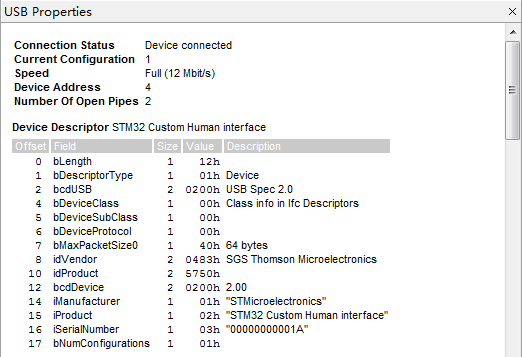




现在继续修改我们代码增加发送PC数据
/**
******************************************************************************
* File Name : main.c
* Description : Main program body
******************************************************************************
* This notice applies to any and all portions of this file
* that are not between comment pairs USER CODE BEGIN and
* USER CODE END. Other portions of this file, whether
* inserted by the user or by software development tools
* are owned by their respective copyright owners.
*
* Copyright (c) 2017 STMicroelectronics International N.V.
* All rights reserved.
*
* Redistribution and use in source and binary forms, with or without
* modification, are permitted, provided that the following conditions are met:
*
* 1. Redistribution of source code must retain the above copyright notice,
* this list of conditions and the following disclaimer.
* 2. Redistributions in binary form must reproduce the above copyright notice,
* this list of conditions and the following disclaimer in the documentation
* and/or other materials provided with the distribution.
* 3. Neither the name of STMicroelectronics nor the names of other
* contributors to this software may be used to endorse or promote products
* derived from this software without specific written permission.
* 4. This software, including modifications and/or derivative works of this
* software, must execute solely and exclusively on microcontroller or
* microprocessor devices manufactured by or for STMicroelectronics.
* 5. Redistribution and use of this software other than as permitted under
* this license is void and will automatically terminate your rights under
* this license.
*
* THIS SOFTWARE IS PROVIDED BY STMICROELECTRONICS AND CONTRIBUTORS "AS IS"
* AND ANY EXPRESS, IMPLIED OR STATUTORY WARRANTIES, INCLUDING, BUT NOT
* LIMITED TO, THE IMPLIED WARRANTIES OF MERCHANTABILITY, FITNESS FOR A
* PARTICULAR PURPOSE AND NON-INFRINGEMENT OF THIRD PARTY INTELLECTUAL PROPERTY
* RIGHTS ARE DISCLAIMED TO THE FULLEST EXTENT PERMITTED BY LAW. IN NO EVENT
* SHALL STMICROELECTRONICS OR CONTRIBUTORS BE LIABLE FOR ANY DIRECT, INDIRECT,
* INCIDENTAL, SPECIAL, EXEMPLARY, OR CONSEQUENTIAL DAMAGES (INCLUDING, BUT NOT
* LIMITED TO, PROCUREMENT OF SUBSTITUTE GOODS OR SERVICES; LOSS OF USE, DATA,
* OR PROFITS; OR BUSINESS INTERRUPTION) HOWEVER CAUSED AND ON ANY THEORY OF
* LIABILITY, WHETHER IN CONTRACT, STRICT LIABILITY, OR TORT (INCLUDING
* NEGLIGENCE OR OTHERWISE) ARISING IN ANY WAY OUT OF THE USE OF THIS SOFTWARE,
* EVEN IF ADVISED OF THE POSSIBILITY OF SUCH DAMAGE.
*
******************************************************************************
*/
/* Includes ------------------------------------------------------------------*/
#include "main.h"
#include "stm32f1xx_hal.h"
#include "usb_device.h" /* USER CODE BEGIN Includes */
#include "usbd_customhid.h"
/* USER CODE END Includes */ /* Private variables ---------------------------------------------------------*/ /* USER CODE BEGIN PV */
/* Private variables ---------------------------------------------------------*/
extern USBD_HandleTypeDef hUsbDeviceFS;
/* USER CODE END PV */ /* Private function prototypes -----------------------------------------------*/
void SystemClock_Config(void);
static void MX_GPIO_Init(void); /* USER CODE BEGIN PFP */
/* Private function prototypes -----------------------------------------------*/ /* USER CODE END PFP */ /* USER CODE BEGIN 0 */ /* USER CODE END 0 */ int main(void)
{ /* USER CODE BEGIN 1 */
uint8_t send_buf[64] = {0};
uint8_t i;
/* USER CODE END 1 */ /* MCU Configuration----------------------------------------------------------*/ /* Reset of all peripherals, Initializes the Flash interface and the Systick. */
HAL_Init(); /* USER CODE BEGIN Init */ /* USER CODE END Init */ /* Configure the system clock */
SystemClock_Config(); /* USER CODE BEGIN SysInit */ /* USER CODE END SysInit */ /* Initialize all configured peripherals */
MX_GPIO_Init();
MX_USB_DEVICE_Init(); /* USER CODE BEGIN 2 */ for(i=0;i<64;i++)
{
send_buf[i] = i;
}
/* USER CODE END 2 */ /* Infinite loop */
/* USER CODE BEGIN WHILE */
while ()
{
/* USER CODE END WHILE */ /* USER CODE BEGIN 3 */ USBD_CUSTOM_HID_SendReport(&hUsbDeviceFS, send_buf, 64);
send_buf[0]++;
HAL_Delay(2000);
}
/* USER CODE END 3 */ } /** System Clock Configuration
*/
void SystemClock_Config(void)
{ RCC_OscInitTypeDef RCC_OscInitStruct;
RCC_ClkInitTypeDef RCC_ClkInitStruct;
RCC_PeriphCLKInitTypeDef PeriphClkInit; /**Initializes the CPU, AHB and APB busses clocks
*/
RCC_OscInitStruct.OscillatorType = RCC_OSCILLATORTYPE_HSE;
RCC_OscInitStruct.HSEState = RCC_HSE_ON;
RCC_OscInitStruct.HSEPredivValue = RCC_HSE_PREDIV_DIV1;
RCC_OscInitStruct.HSIState = RCC_HSI_ON;
RCC_OscInitStruct.PLL.PLLState = RCC_PLL_ON;
RCC_OscInitStruct.PLL.PLLSource = RCC_PLLSOURCE_HSE;
RCC_OscInitStruct.PLL.PLLMUL = RCC_PLL_MUL9;
if (HAL_RCC_OscConfig(&RCC_OscInitStruct) != HAL_OK)
{
_Error_Handler(__FILE__, __LINE__);
} /**Initializes the CPU, AHB and APB busses clocks
*/
RCC_ClkInitStruct.ClockType = RCC_CLOCKTYPE_HCLK|RCC_CLOCKTYPE_SYSCLK
|RCC_CLOCKTYPE_PCLK1|RCC_CLOCKTYPE_PCLK2;
RCC_ClkInitStruct.SYSCLKSource = RCC_SYSCLKSOURCE_PLLCLK;
RCC_ClkInitStruct.AHBCLKDivider = RCC_SYSCLK_DIV1;
RCC_ClkInitStruct.APB1CLKDivider = RCC_HCLK_DIV2;
RCC_ClkInitStruct.APB2CLKDivider = RCC_HCLK_DIV1; if (HAL_RCC_ClockConfig(&RCC_ClkInitStruct, FLASH_LATENCY_2) != HAL_OK)
{
_Error_Handler(__FILE__, __LINE__);
} PeriphClkInit.PeriphClockSelection = RCC_PERIPHCLK_USB;
PeriphClkInit.UsbClockSelection = RCC_USBCLKSOURCE_PLL_DIV1_5;
if (HAL_RCCEx_PeriphCLKConfig(&PeriphClkInit) != HAL_OK)
{
_Error_Handler(__FILE__, __LINE__);
} /**Configure the Systick interrupt time
*/
HAL_SYSTICK_Config(HAL_RCC_GetHCLKFreq()/); /**Configure the Systick
*/
HAL_SYSTICK_CLKSourceConfig(SYSTICK_CLKSOURCE_HCLK); /* SysTick_IRQn interrupt configuration */
HAL_NVIC_SetPriority(SysTick_IRQn, , );
} /** Configure pins as
* Analog
* Input
* Output
* EVENT_OUT
* EXTI
*/
static void MX_GPIO_Init(void)
{ /* GPIO Ports Clock Enable */
__HAL_RCC_GPIOC_CLK_ENABLE();
__HAL_RCC_GPIOD_CLK_ENABLE();
__HAL_RCC_GPIOA_CLK_ENABLE(); } /* USER CODE BEGIN 4 */ /* USER CODE END 4 */ /**
* @brief This function is executed in case of error occurrence.
* @param None
* @retval None
*/
void _Error_Handler(char * file, int line)
{
/* USER CODE BEGIN Error_Handler_Debug */
/* User can add his own implementation to report the HAL error return state */
while()
{
}
/* USER CODE END Error_Handler_Debug */
} #ifdef USE_FULL_ASSERT /**
* @brief Reports the name of the source file and the source line number
* where the assert_param error has occurred.
* @param file: pointer to the source file name
* @param line: assert_param error line source number
* @retval None
*/
void assert_failed(uint8_t* file, uint32_t line)
{
/* USER CODE BEGIN 6 */
/* User can add his own implementation to report the file name and line number,
ex: printf("Wrong parameters value: file %s on line %d\r\n", file, line) */
/* USER CODE END 6 */ } #endif /**
* @}
*/ /**
* @}
*/ /************************ (C) COPYRIGHT STMicroelectronics *****END OF FILE****/
可以看到下面的数据在变化
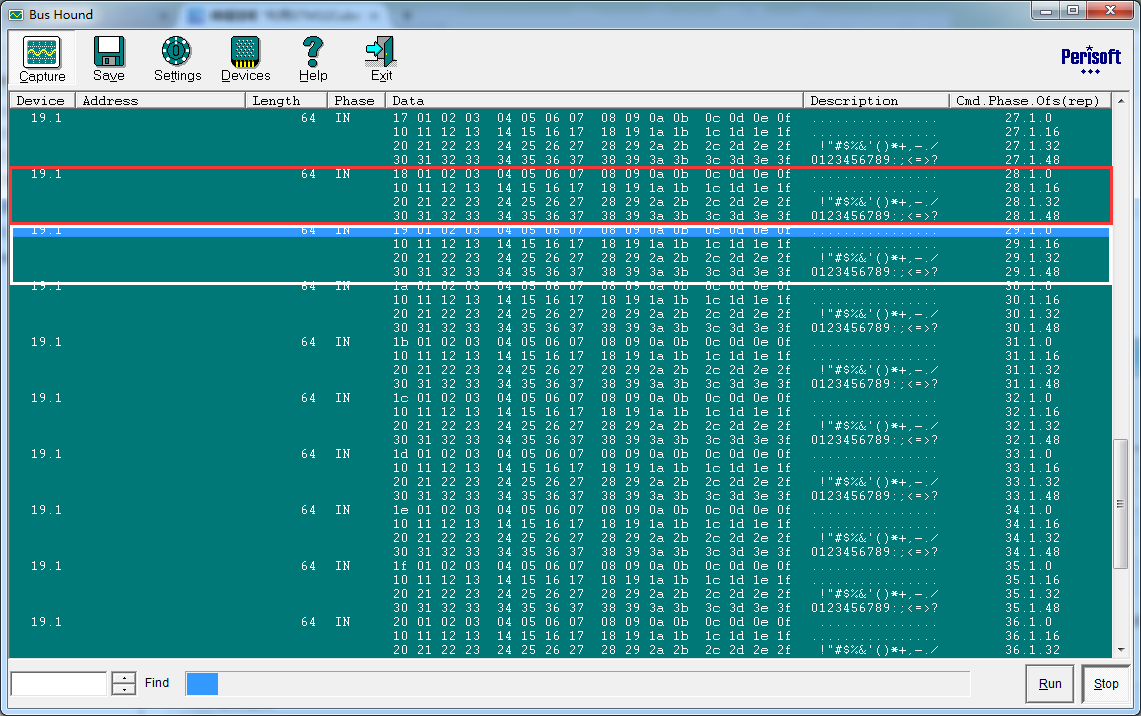
bus hound的设置如下
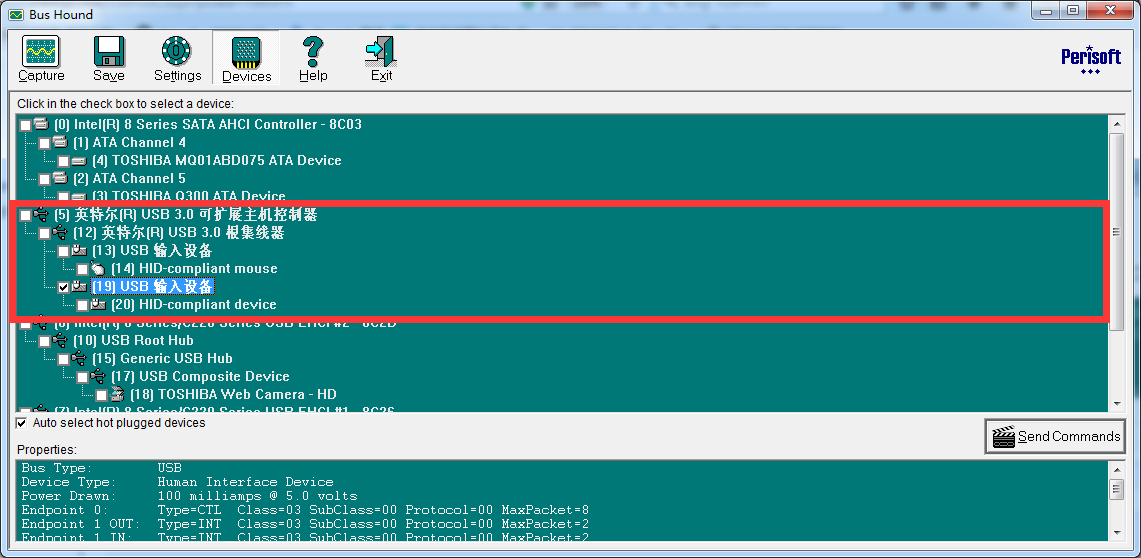

现在使用bus hound发送数据到MCU
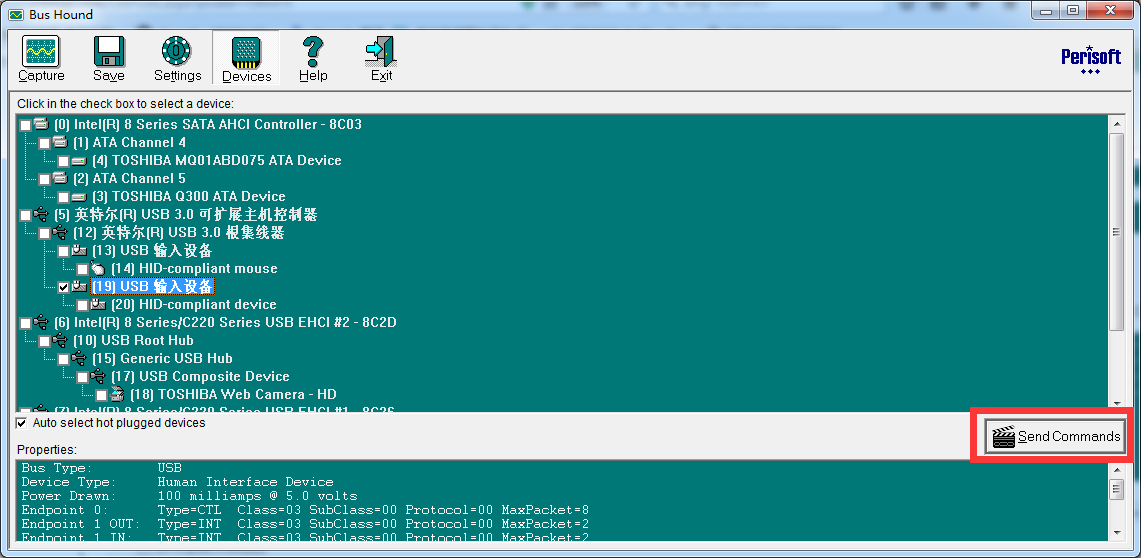


现在修改一下工程代码
注释掉main.C中的
// USBD_CUSTOM_HID_SendReport(&hUsbDeviceFS, &send_buf[0],64);
// send_buf[0]++;
// HAL_Delay(2000);
/**
******************************************************************************
* File Name : main.c
* Description : Main program body
******************************************************************************
* This notice applies to any and all portions of this file
* that are not between comment pairs USER CODE BEGIN and
* USER CODE END. Other portions of this file, whether
* inserted by the user or by software development tools
* are owned by their respective copyright owners.
*
* Copyright (c) 2017 STMicroelectronics International N.V.
* All rights reserved.
*
* Redistribution and use in source and binary forms, with or without
* modification, are permitted, provided that the following conditions are met:
*
* 1. Redistribution of source code must retain the above copyright notice,
* this list of conditions and the following disclaimer.
* 2. Redistributions in binary form must reproduce the above copyright notice,
* this list of conditions and the following disclaimer in the documentation
* and/or other materials provided with the distribution.
* 3. Neither the name of STMicroelectronics nor the names of other
* contributors to this software may be used to endorse or promote products
* derived from this software without specific written permission.
* 4. This software, including modifications and/or derivative works of this
* software, must execute solely and exclusively on microcontroller or
* microprocessor devices manufactured by or for STMicroelectronics.
* 5. Redistribution and use of this software other than as permitted under
* this license is void and will automatically terminate your rights under
* this license.
*
* THIS SOFTWARE IS PROVIDED BY STMICROELECTRONICS AND CONTRIBUTORS "AS IS"
* AND ANY EXPRESS, IMPLIED OR STATUTORY WARRANTIES, INCLUDING, BUT NOT
* LIMITED TO, THE IMPLIED WARRANTIES OF MERCHANTABILITY, FITNESS FOR A
* PARTICULAR PURPOSE AND NON-INFRINGEMENT OF THIRD PARTY INTELLECTUAL PROPERTY
* RIGHTS ARE DISCLAIMED TO THE FULLEST EXTENT PERMITTED BY LAW. IN NO EVENT
* SHALL STMICROELECTRONICS OR CONTRIBUTORS BE LIABLE FOR ANY DIRECT, INDIRECT,
* INCIDENTAL, SPECIAL, EXEMPLARY, OR CONSEQUENTIAL DAMAGES (INCLUDING, BUT NOT
* LIMITED TO, PROCUREMENT OF SUBSTITUTE GOODS OR SERVICES; LOSS OF USE, DATA,
* OR PROFITS; OR BUSINESS INTERRUPTION) HOWEVER CAUSED AND ON ANY THEORY OF
* LIABILITY, WHETHER IN CONTRACT, STRICT LIABILITY, OR TORT (INCLUDING
* NEGLIGENCE OR OTHERWISE) ARISING IN ANY WAY OUT OF THE USE OF THIS SOFTWARE,
* EVEN IF ADVISED OF THE POSSIBILITY OF SUCH DAMAGE.
*
******************************************************************************
*/
/* Includes ------------------------------------------------------------------*/
#include "main.h"
#include "stm32f1xx_hal.h"
#include "usb_device.h" /* USER CODE BEGIN Includes */
#include "usbd_customhid.h"
/* USER CODE END Includes */ /* Private variables ---------------------------------------------------------*/ /* USER CODE BEGIN PV */
/* Private variables ---------------------------------------------------------*/
extern USBD_HandleTypeDef hUsbDeviceFS;
/* USER CODE END PV */ /* Private function prototypes -----------------------------------------------*/
void SystemClock_Config(void);
static void MX_GPIO_Init(void); /* USER CODE BEGIN PFP */
/* Private function prototypes -----------------------------------------------*/ /* USER CODE END PFP */ /* USER CODE BEGIN 0 */ /* USER CODE END 0 */ int main(void)
{ /* USER CODE BEGIN 1 */
uint8_t send_buf[] = {0XFF};
uint8_t i;
/* USER CODE END 1 */ /* MCU Configuration----------------------------------------------------------*/ /* Reset of all peripherals, Initializes the Flash interface and the Systick. */
HAL_Init(); /* USER CODE BEGIN Init */ /* USER CODE END Init */ /* Configure the system clock */
SystemClock_Config(); /* USER CODE BEGIN SysInit */ /* USER CODE END SysInit */ /* Initialize all configured peripherals */
MX_GPIO_Init();
MX_USB_DEVICE_Init(); /* USER CODE BEGIN 2 */ for(i=;i<;i++)
{
send_buf[i] = i;
}
/* USER CODE END 2 */ /* Infinite loop */
/* USER CODE BEGIN WHILE */
while ()
{
/* USER CODE END WHILE */ /* USER CODE BEGIN 3 */ // USBD_CUSTOM_HID_SendReport(&hUsbDeviceFS, &send_buf[0],64);
// send_buf[0]++;
// HAL_Delay(2000);
}
/* USER CODE END 3 */ } /** System Clock Configuration
*/
void SystemClock_Config(void)
{ RCC_OscInitTypeDef RCC_OscInitStruct;
RCC_ClkInitTypeDef RCC_ClkInitStruct;
RCC_PeriphCLKInitTypeDef PeriphClkInit; /**Initializes the CPU, AHB and APB busses clocks
*/
RCC_OscInitStruct.OscillatorType = RCC_OSCILLATORTYPE_HSE;
RCC_OscInitStruct.HSEState = RCC_HSE_ON;
RCC_OscInitStruct.HSEPredivValue = RCC_HSE_PREDIV_DIV1;
RCC_OscInitStruct.HSIState = RCC_HSI_ON;
RCC_OscInitStruct.PLL.PLLState = RCC_PLL_ON;
RCC_OscInitStruct.PLL.PLLSource = RCC_PLLSOURCE_HSE;
RCC_OscInitStruct.PLL.PLLMUL = RCC_PLL_MUL9;
if (HAL_RCC_OscConfig(&RCC_OscInitStruct) != HAL_OK)
{
_Error_Handler(__FILE__, __LINE__);
} /**Initializes the CPU, AHB and APB busses clocks
*/
RCC_ClkInitStruct.ClockType = RCC_CLOCKTYPE_HCLK|RCC_CLOCKTYPE_SYSCLK
|RCC_CLOCKTYPE_PCLK1|RCC_CLOCKTYPE_PCLK2;
RCC_ClkInitStruct.SYSCLKSource = RCC_SYSCLKSOURCE_PLLCLK;
RCC_ClkInitStruct.AHBCLKDivider = RCC_SYSCLK_DIV1;
RCC_ClkInitStruct.APB1CLKDivider = RCC_HCLK_DIV2;
RCC_ClkInitStruct.APB2CLKDivider = RCC_HCLK_DIV1; if (HAL_RCC_ClockConfig(&RCC_ClkInitStruct, FLASH_LATENCY_2) != HAL_OK)
{
_Error_Handler(__FILE__, __LINE__);
} PeriphClkInit.PeriphClockSelection = RCC_PERIPHCLK_USB;
PeriphClkInit.UsbClockSelection = RCC_USBCLKSOURCE_PLL_DIV1_5;
if (HAL_RCCEx_PeriphCLKConfig(&PeriphClkInit) != HAL_OK)
{
_Error_Handler(__FILE__, __LINE__);
} /**Configure the Systick interrupt time
*/
HAL_SYSTICK_Config(HAL_RCC_GetHCLKFreq()/); /**Configure the Systick
*/
HAL_SYSTICK_CLKSourceConfig(SYSTICK_CLKSOURCE_HCLK); /* SysTick_IRQn interrupt configuration */
HAL_NVIC_SetPriority(SysTick_IRQn, , );
} /** Configure pins as
* Analog
* Input
* Output
* EVENT_OUT
* EXTI
*/
static void MX_GPIO_Init(void)
{ /* GPIO Ports Clock Enable */
__HAL_RCC_GPIOC_CLK_ENABLE();
__HAL_RCC_GPIOD_CLK_ENABLE();
__HAL_RCC_GPIOA_CLK_ENABLE(); } /* USER CODE BEGIN 4 */ /* USER CODE END 4 */ /**
* @brief This function is executed in case of error occurrence.
* @param None
* @retval None
*/
void _Error_Handler(char * file, int line)
{
/* USER CODE BEGIN Error_Handler_Debug */
/* User can add his own implementation to report the HAL error return state */
while()
{
}
/* USER CODE END Error_Handler_Debug */
} #ifdef USE_FULL_ASSERT /**
* @brief Reports the name of the source file and the source line number
* where the assert_param error has occurred.
* @param file: pointer to the source file name
* @param line: assert_param error line source number
* @retval None
*/
void assert_failed(uint8_t* file, uint32_t line)
{
/* USER CODE BEGIN 6 */
/* User can add his own implementation to report the file name and line number,
ex: printf("Wrong parameters value: file %s on line %d\r\n", file, line) */
/* USER CODE END 6 */ } #endif /**
* @}
*/ /**
* @}
*/ /************************ (C) COPYRIGHT STMicroelectronics *****END OF FILE****/
修改在usbd_custom_hid_if.c
/**
* @brief CUSTOM_HID_OutEvent_FS
* Manage the CUSTOM HID class events
* @param event_idx: event index
* @param state: event state
* @retval Result of the operation: USBD_OK if all operations are OK else USBD_FAIL
*/
static int8_t CUSTOM_HID_OutEvent_FS (uint8_t event_idx, uint8_t state)
{
/* USER CODE BEGIN 6 */
USBD_CUSTOM_HID_HandleTypeDef *hhid = hUsbDeviceFS.pClassData; USBD_CUSTOM_HID_SendReport(&hUsbDeviceFS, hhid->Report_buf,);
return ();
/* USER CODE END 6 */
}
好了测试一下


存在一个问题当PC发送不是64位时怎么处理??未解决
后面找到一些资料: 所有的 HID 数据都必须使用定义过的报表格式来定义报表中数据的大小与内容。设备可
以支持一个或多个报表。在固件中的报表描述符用来描述了此报表,以及如何使用报表数据的
信息。

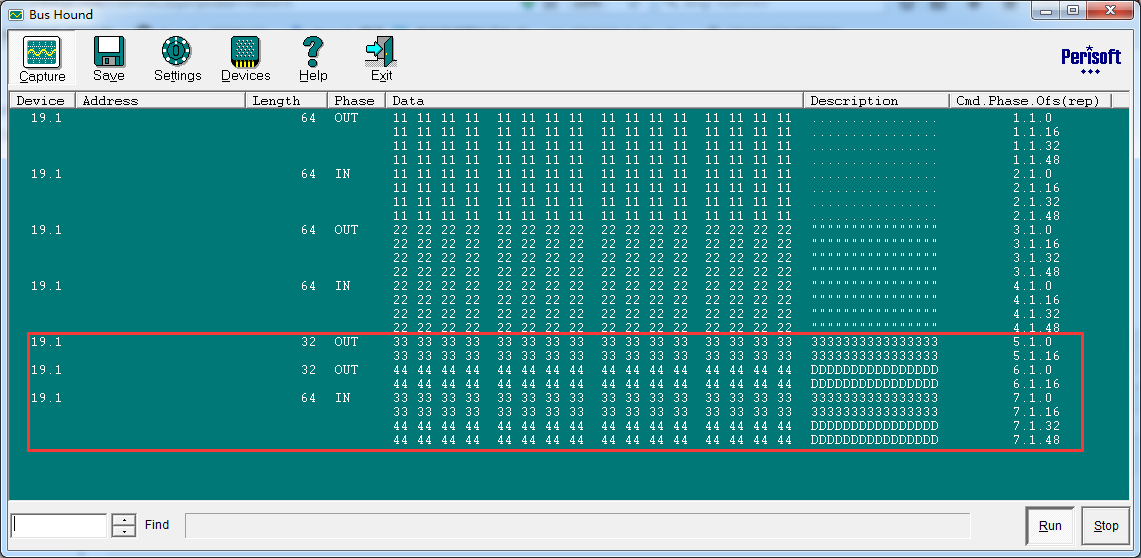
利用STM32CubeMX生成HID双向通讯工程的更多相关文章
- 利用STM32CubeMX来生成USB_HID_Mouse工程【添加ADC】(1)
现在原来的基础上添加ADC的功能. 现在(利用STM32CubeMX来生成USB_HID_Mouse工程)基础上新增硬件 JoyStick Shield 游戏摇杆扩展板 与STM32F103C8的连接 ...
- 利用STM32CubeMX来生成USB_HID_Mouse工程
硬件开发板:STM32F103C8 软件平台 好了现在开始利用STM32CubeMX来生成我们的工程 1.新建工程 选择MCU的型号 选择选择时钟 开启usb的模块 选择USB的类 配置时钟树(主要是 ...
- 使用STM32CubeMX生成USB_HOST_HID工程[添加对CAPS_LOCK指示灯的控制][SetReport]
在之前(使用STM32CubeMX生成USB_HOST_HID工程)的基础上进行修改 在结合之前在pc上的测试 USB之HID类Set_Report Request[调试手记1] 测试代码如下: /* ...
- 使用STM32CubeMX生成RTC工程[闹钟中断2]
在上次使用STM32CubeMX生成RTC工程[闹钟中断]基础上实现周期间隔的闹钟 一些场合需要周期性的闹钟 现在为了方便设置每十秒来一次. 备注: 当然可以直接修改HAL库static HAL_St ...
- 重温WCF之数单向通讯、双向通讯、回调操作(五)
一.单向通讯单向操作不等同于异步操作,单向操作只是在发出调用的瞬间阻塞客户端,但如果发出多个单向调用,WCF会将请求调用放入到服务器端的队列中,并在某个时间进行执行.队列的存储个数有限,一旦发出的调用 ...
- silverlight与wcf双向通讯 例子
本文将建立一个silverlight与wcf双向通讯的简单实例,以下是详细步骤: 新建Silverlight应用程序,名称WCFtest.解决方案中添加WCF服务应用程序,名称WcfServiceTe ...
- Java进阶(五十二)利用LOG4J生成服务日志
Java进阶(五十二)利用LOG4J生成服务日志 前言 由于论文写作需求,需要进行流程挖掘.前提是需要有真实的事件日志数据.真实的事件日志数据可以用来发现.监控和提升业务流程. 为了获得真实的事件日志 ...
- C++的MFC 与 HTML 双向通讯
C++中嵌入ie浏览器总结(1) - ie边框 及上下文菜单 最近项目中用html 来做界面,也就折腾了一下在wxwidget中嵌入浏览器的若干细节工作,mfc也基本是类似的,由于wxwidget中已 ...
- 利用Zynq Soc创建一个嵌入式工程
英文题目:Using the Zynq SoC Processing System,参考自ADI的ug1165文档. 利用Zynq Soc创建一个嵌入式工程,该工程总体上包括五个步骤: 步骤一.新建空 ...
随机推荐
- Android Studio 增加函数注释模板
此篇文章主要介绍如何在Android Studio中函数如何添加注释,使其和eclipse一样方便的添加注释 Android Studio默认函数注释为 /** * */ 下面方法将要改为如下格式 / ...
- 【深度学习】BP反向传播算法Python简单实现
转载:火烫火烫的 个人觉得BP反向传播是深度学习的一个基础,所以很有必要把反向传播算法好好学一下 得益于一步一步弄懂反向传播的例子这篇文章,给出一个例子来说明反向传播 不过是英文的,如果你感觉不好阅读 ...
- 将Json对象数组转化成JS Array数组
private format(cards:any):Array<any>{ var result = new Array(); cards.forEach(element => { ...
- 51nod1302 矩形面积交
有2N个矩形,这些矩形被标号为0 ~ 2N-1,对于第i个矩形其长宽分别为X[i]与Y[i].现在要把这2N个矩形分为两组,每组N个,每个矩形恰好分到两组中的一组里.分成两组后,设两组分别为A组.B组 ...
- vue-router总结
之前写过一篇关于vue-router的文章,主要是介绍怎么结合cli2在项目中使用vue-router,比较的简单,今天想结合cli3来总结一下vue-router的具体用法. cli3 在介绍vue ...
- java1.8 新特性(五 如何使用filter,limit ,skip ,distinct map flatmap ,collect 操作 java集合)
使用filter 根据 条件筛选 出结果:例如 找出 user 中 age >=15 的用户 package lambda.stream; /** * @author 作者:cb * @vers ...
- Java-Runoob-高级教程-实例-方法:13. Java 实例 – for 和 foreach循环使用
ylbtech-Java-Runoob-高级教程-实例-方法:13. Java 实例 – for 和 foreach循环使用 1.返回顶部 1. Java 实例 - for 和 foreach循环使用 ...
- python输出缓冲区的问题
碰到的问题,一段代码,print在前,log的在后,查看日志中log的反而在前面.是python输出缓冲区的问题. python输出缓冲区要满 4k 才写入文件,除非禁用缓存或者强制输出或者程序结束. ...
- python直接下载图片到内存
1. 使用requests(推荐) from PIL import Image import requests Image.open(requests.get(url, stream=True).ra ...
- OpenStack单节点网络设置
一.上传镜像文件 1.上传镜像 2.检索镜像 二.创建网络 1.创建内部网络 2.创建外部网络 3.创建内部网络子网 设置DHCP分配地址池,点击已创建 4.创建外部网络子网 注意:外部网络与仅主机( ...
